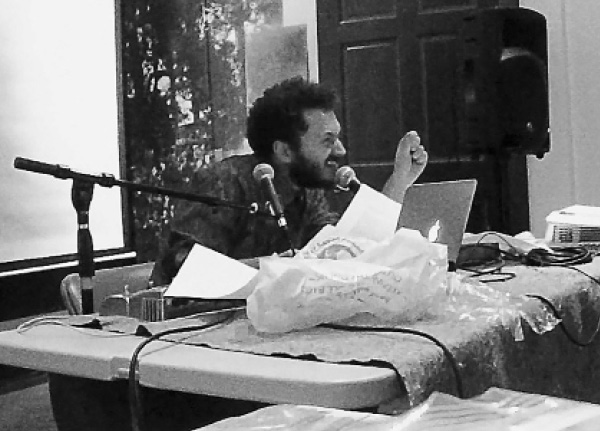
O UR GAB LIVE!
first performed on November 2, 2017
Comfort Station, Chicago, IL
performed twice in 2017
BEN ZUCKER
Chicago, IL
933925569z933925569v933925569i933925569b933925569e933925569s933925569@933925569c933925569o933925569m933925569c933925569a933925569s933925569t933925569.933925569n933925569e933925569t
benzuckersounds.com
O UR GAB LIVE!
BEN ZUCKER
You will hear words in the shape of music, and music in the shape of words. These words may be about things. We are here to offer you a listening experience where you will take nothing for granted, where you will learn, and hear, and question. There will be stories, there will be interviews with special guests, there will be things neither of us can anticipate.
This performance/composition, which mixes vocal improvisation, noise, and sound poetry in the form of a podcast, builds off concepts explored on an album of the same name. The title plays on the name of Kenneth Gaburo, who conceived of language as an extended vocal technique with a corresponding “compositional linguistics.” As an occasional listener to a couple of podcasts, informative and dramatic, I wanted to find a way to incorporate experimental modes of speech into the narrative and structural tropes of podcasts, especially the seemingly ubiquitous conversation-based series, and the typified presentation of NPR storytelling series, such as “This American Life.” Presenting such a podcast as a “special live episode” offered more opportunity to highlight spontaneity and improvisation in relation to podcasting’s highly-mediated liveness.
A script was developed involving modular collections of speech (both legible and illegible), background and transitional music, and spaces for vocal and gesture-based improvisation. The texts were often full of self-interruptions, circular meaning, and allusion to nonexistent prior episodes. A pair of microphones connecting to DSP software allowed for the creation of a variety of voices, so I could deliver monologues or have conversations with myself. At one point, I directed an actual phone call (arranged before the performance) through the software to have a dialogue of reversed voices such that the caller and I could converse without actually communicating.
Meanwhile, a variety of small props were used to enhance or interrupt the experience of the podcast as “live.” What are we actually listening for in speech, and what is taken for granted? The field of vocal improvisation and sound poetry opens up the minuscule aspects of the voice, yet in mediated communication such subtlety risks being erased or set aside in favor of meaning, conversation, or the listener’s own habits of listening. This performance sought to manipulate the secretly uncanny aspects of the medium by mediating the listener’s expectations.